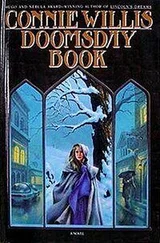She made the circuit of the glade again, looking for wood. Dunworthy had insisted she learn to build a fire without tinder or flint. “Gilchrist expects you to wander around the Middle Ages in the dead of winter without knowing how to build a fire?” he had said, outraged, and she had defended him, told him Mediaeval didn’t expect her to spend that much time out of doors. But they should have realized how cold it could get.
The sticks made her hands cold, and every time she bent over to pick up a stick, her head hurt. Eventually she stopped bending over altogether and simply stooped and grabbed for the broken-off twigs, keeping her head straight. That helped a little, but not much. Maybe she was feeling this way because she was so cold. Maybe the headache, the breathlessness, were coming from being so cold. She had to get the fire started.
The wood felt icy-cold and wet. It would never burn. And the leaves would be damp, too, far too damp to use for tinder. She had to have dry kindling and a sharp stick to start a fire. She laid the wood down in a little bundle by the roots of a tree, careful to keep her head straight, and went back to the wagon.
The bashed-in side of the wagon had several broken pieces of wood she could use for kindling. She got two splinters in her hand before she managed to pull them free, but the wood at least felt dry, though it was cold, too. There was a large, sharp spur of wood just above the wheel. She bent over to grab it and nearly fell, gasping with the sudden nauseating dizziness.
“You’d better lie down,” she said out loud.
She eased herself to sitting, holding onto the ribs of the wagon for support. “Dr. Ahrens,” she said a little breathlessly, “you ought to come up with something to prevent time-lag. This is awful.”
If she could just lie down for a bit, perhaps the dizziness would go away and she could build the fire. She couldn’t do it without bending over, though, and just the thought of doing that brought the nausea back.
She pulled her hood up over her head and closed her eyes, and even that hurt, the action seeming to focus the pain in her head. Something was wrong. This could not possibly be a reaction to time-lag. She was supposed to have a few minor symptoms that would fade within an hour or two of her arrival, not get worse. A little headache, Dr. Ahrens had said, some fatigue. She hadn’t said anything about nausea, about being racked with cold.
She was so cold. She pulled the skirts of her cloak around her like a blanket, but the action seemed to make her even colder. Her teeth began to chatter, the way they had up on the hill, and great, convulsive shudders shook her shoulders.
I’m going to freeze to death, she thought. But it can’t be helped. I can’t get up and start the fire. I can’t. I’m too cold. It’s too bad you were wrong about the contemps, Mr. Dunworthy, she thought, and even the thought was dizzy. Being burned at the stake sounds lovely.
She would not have believed that she could have fallen asleep, huddled there on the cold ground. She had not noticed any spreading warmth, and if she had she would have been afraid it was the creeping numbness of hypothermia and tried to fight it. But she must have slept because when she opened her eyes again it was night in the glade, full night with frosty stars in the net of branches overhead, and she was on the ground looking up at them.
She had slid down as she slept, so that the top of her head was against the wheel. She was still shivering with cold, though her teeth had stopped chattering. Her head had begun to throb, tolling like a bell, and her whole body ached, especially her chest, where she had held the wood against her while she gathered sticks for the fire.
Something’s wrong , she thought, and this time there was real panic in the thought. Maybe she was having some kind of allergic reaction to time travel. Was there even such a thing? Dunworthy had never said anything about an allergic reaction, and he had warned her about everything: rape and cholera and typhoid and the plague.
She twisted her hand around inside the cloak and felt under her arm for the place where she had had the welt from the antiviral inoculation. The welt was still there, though it didn’t hurt to touch it, and it had stopped itching. Maybe that was a bad sign, she thought. Maybe the fact that it had stopped itching meant that it had stopped working.
She tried to lift her head. The dizziness came back instantly. She lay her head back down and disentangled her hands from the cloak, carefully and slowly, the nausea cutting across every movement. She folded her hands and pressed them against her face. “Mr. Dunworthy,” she said. “I think you’d better come and get me.”
She slept again, and when she woke up she could hear the faint, jangling sound of the piped-in Christmas music. Oh, good, she thought, they’ve got the net open, and tried to pull herself to sitting against the wheel.
“Oh, Mr. Dunworthy, I’m so glad you came back,’ she said, fighting the nausea. “I was afraid you wouldn’t get my message.”
The jangling sound became louder, and she could see a wavering light. She pulled herself up a little farther. “You got the fire started,” she said. “You were right about it’s getting cold.” The wagon’s wheel felt icy through her cloak. Her teeth started to chatter again. “Dr. Ahrens was right. I should have waited till the swelling went down. I didn’t know the reaction would be this bad.”
It wasn’t a fire, after all. It was a lantern. Dunworthy was carrying it as he walked toward her.
“This doesn’t mean I’m getting a virus, does it? Or the plague?” She was having trouble getting the words out, her teeth were chattering so hard. “Wouldn’t that be awful? Having the plague in the Middle Ages? At least I’d fit right in.”
She laughed, a high-pitched, almost hysterical laugh that would probably frighten Mr. Dunworthy to death. “It’s all right,” she said, and she could hardly understand her own words. “I know you were worried, but I’ll be perfectly all right. I just—”
He stopped in front of her, the lantern lighting a wobbling circle on the ground in front of her. She could see Dunworthy’s feet. He was wearing shapeless leather shoes, the kind that had made the footprint. She tried to say something about the shoes, to ask him whether Mr. Gilchrist had made him put on Authentic Mediaeval Dress just to come and fetch her, but the light’s movement was making her dizzy again.
She closed her eyes, and when she opened them again, he was kneeling in front of her. He had set the lantern down, and the light lit the hood of his cloak and folded hands.
“It’s all right,” she said. “I know you were worried, but I’m all right. Truly. I just felt a little ill.”
He raised his head. “ Certes, it been derlostuh dayes forgott foreto getest hissahntes im aller ,” he said.
He had a hard, lined face, a cruel face, a cutthroat’s face. He had watched her lying there and then he had gone away and waited for it to get dark, and now he had come back.
Kivrin tried to put up a hand to fend him off, but her hands had got tangled somehow in the cloak. “Go away,” she said, her teeth chattering so hard she couldn’t get the words out. “Go away.”
He said something else, with a rising inflection this time, a question. She couldn’t understand what he was saying. It’s Middle English, she thought. I studied it for three years, and Mr. Latimer taught me everything there is to know about adjectival inflection. I should be able to understand it. It’s the fever, she thought. That’s why I can’t make out what he’s saying.
He repeated the question or asked some other question, she couldn’t even tell that much.
Читать дальше












